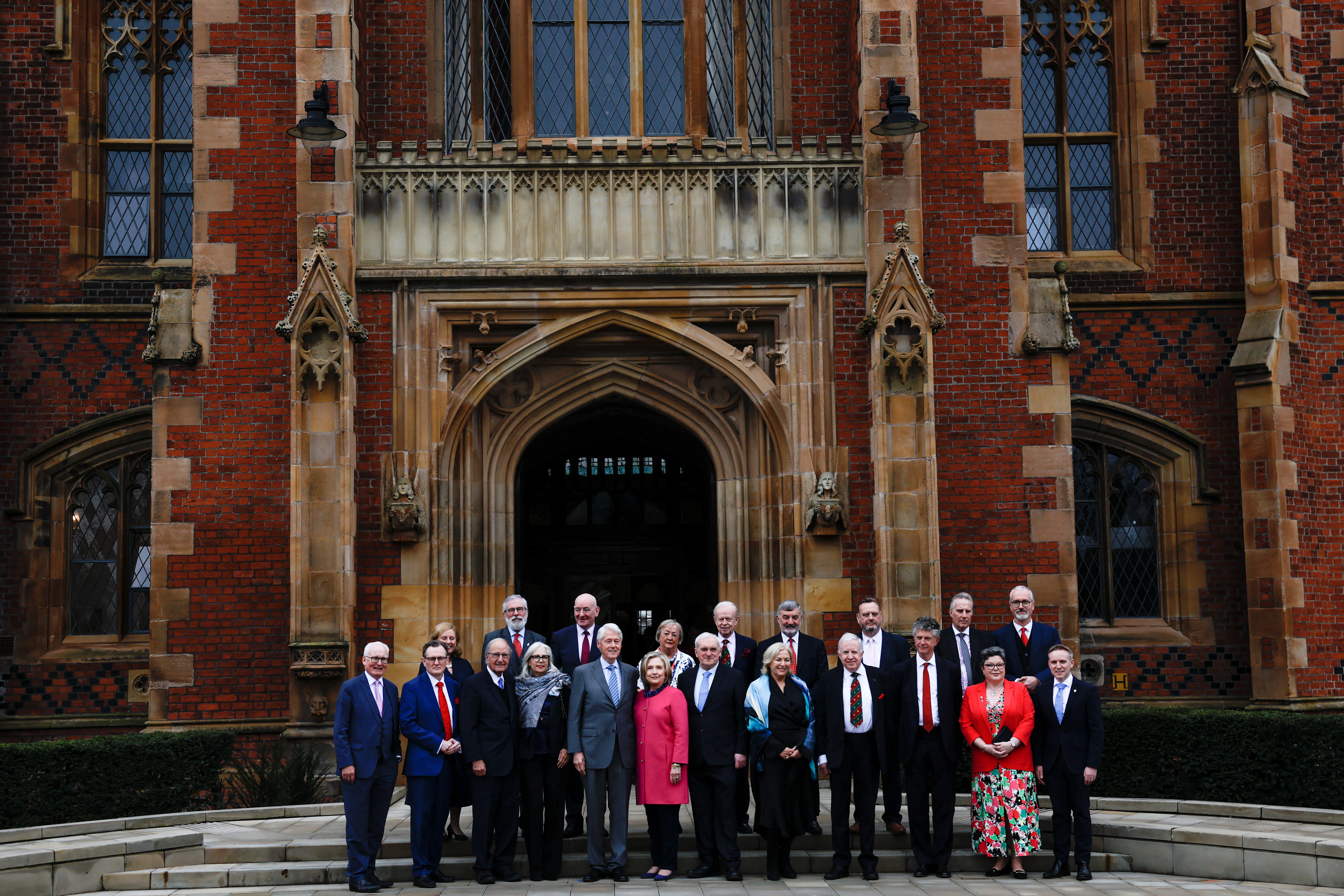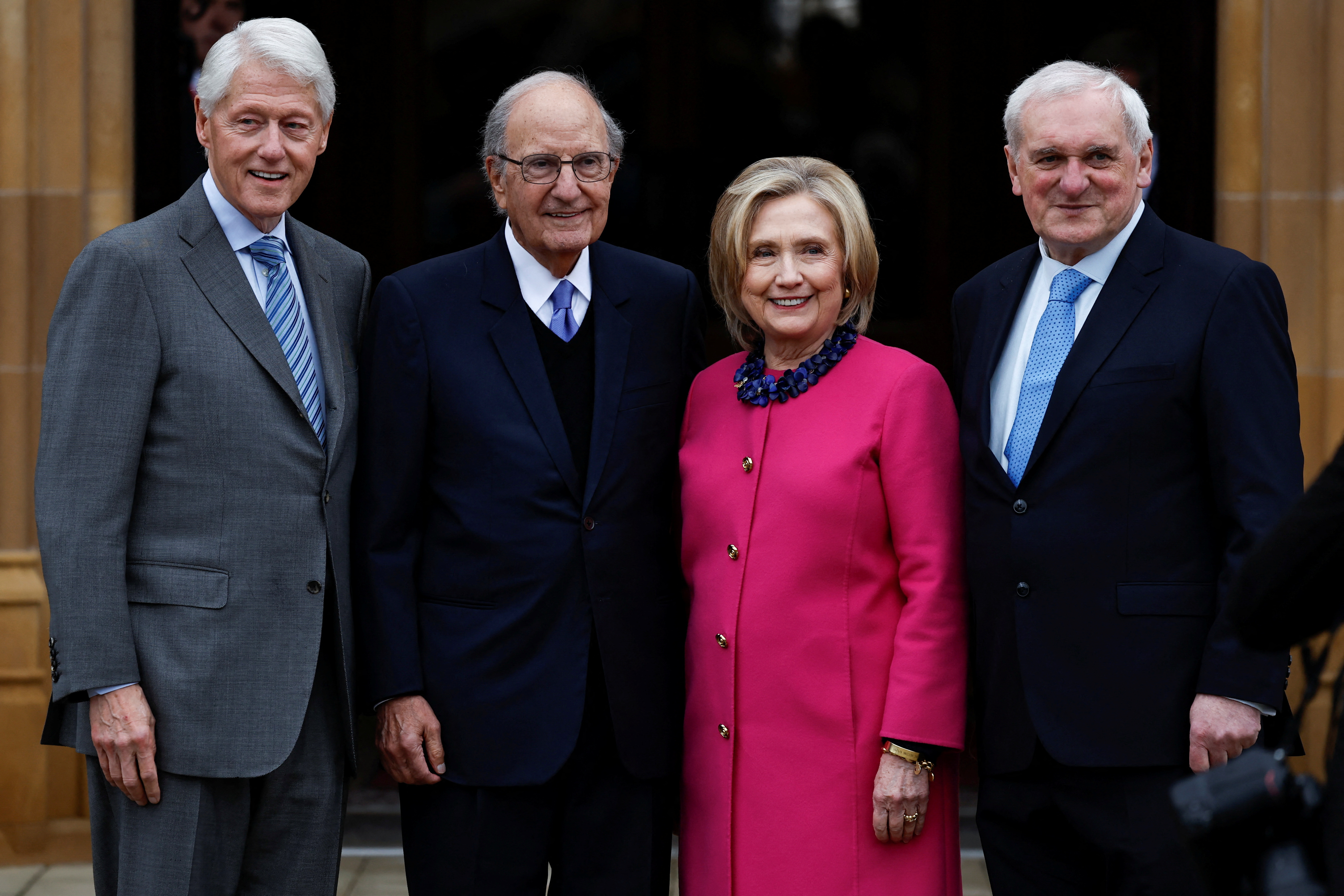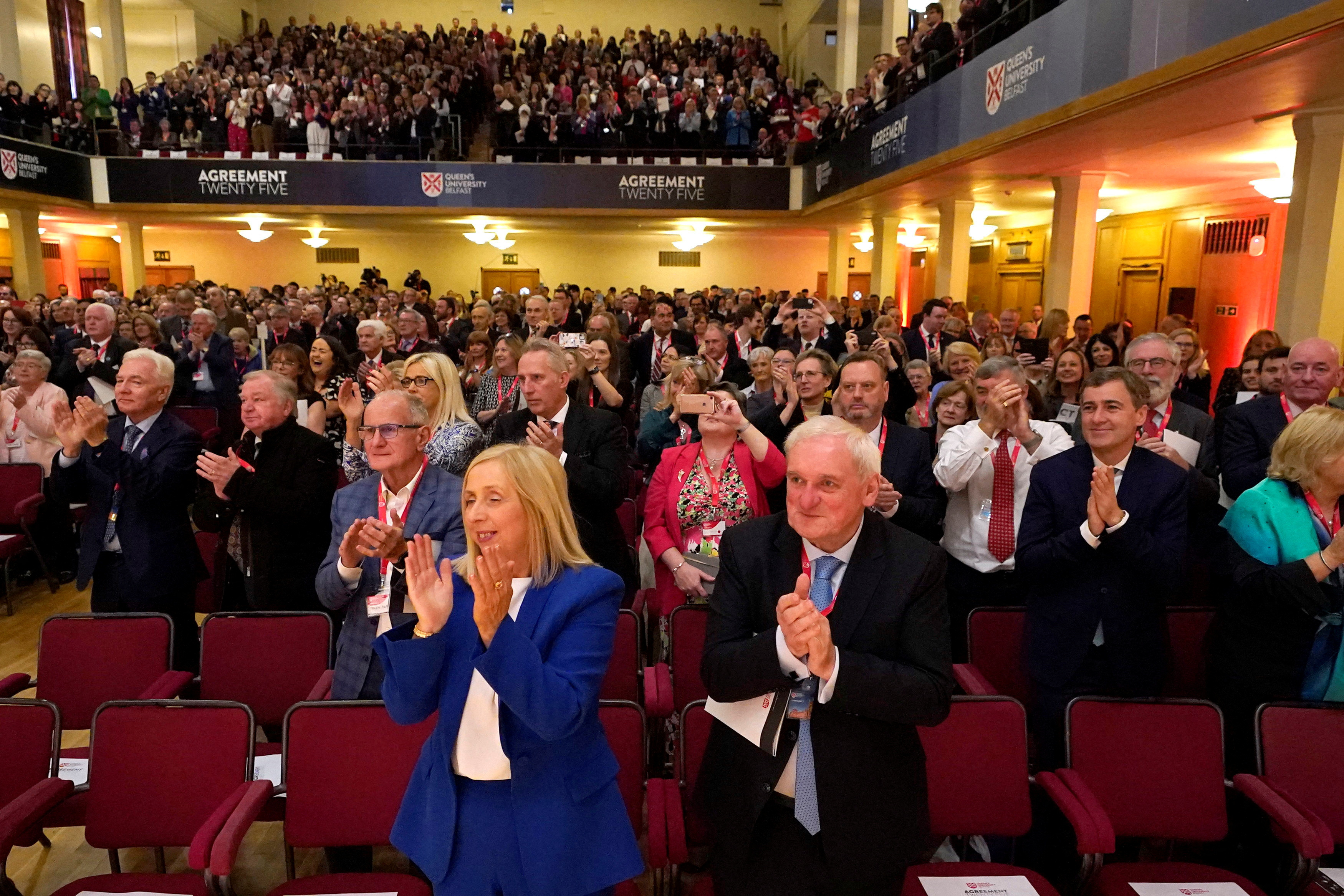Twenty-nine women from political and civic society were honored on Monday at an event to mark 25 years of Northern Ireland’s Good Friday Agreement that former U.S. Secretary of State Hillary Clinton said would not have been possible without them. Clinton, the chancellor of Queen’s University Belfast who in her time as Secretary of State worked with the political parties in implementing the deal, praised the recipients of medals and honorary degrees as “determined, unstoppable forces for peace”. The Associated Press has the story:
Bill, Hilary Clinton mark N. Ireland Peace deal
Newslooks- BELFAST, Northern Ireland (AP)
Former U.S. President Bill Clinton and past leaders of the U.K. and Ireland gathered in Belfast on Monday, 25 years after their charm, clout and determination helped Northern Ireland strike a historic peace accord.

They met to remember a moment, said former U.S. Senator George Mitchell, “when history opened itself to hope,” in a Northern Ireland that has changed dramatically since 1998 — and where some wonder if the accord that created peace is still capable of sustaining it.

“Twenty-five years ago the people of Northern Ireland and their leaders changed the course of history,” said Mitchell, 89, who chaired two arduous years of peace negotiations that led to the accord.
A quarter-century on, “the people of Northern Ireland continue to wrestle with their doubts, their differences, their disagreements,” he said. But, he added: “The people of Northern Ireland don’t want to return to violence — not now and not ever.”

A young peacetime generation is increasingly shedding the rival identities — British unionist and Irish nationalist — that erupted into three decades of bloodshed that killed 3,600 people. But at the same time, Northern Ireland is locked in a political crisis that threatens to rattle the peace secured by the Good Friday Agreement.
“You’ve got a transformed society in which (the labels) unionist, nationalist for many young people doesn’t mean anything,” said Katy Hayward, professor of political sociology at Queen’s.
“But on the other hand, society is in a state of quite severe disrepair. We haven’t had a functioning Assembly for four out of the last six years, and our public services are crumbling around our ears.”

Clinton, who recently called the day the peace deal was struck “one of the happiest days of my presidency, indeed of my entire life,” is joining former U.K. Prime Minister Tony Blair, ex-Irish Prime Minister Bertie Ahern and Northern Ireland politicians and peacemakers at the Queen’s University Belfast conference.
Former U.S. Secretary of State Hillary Clinton, Queen’s University’s chancellor, urged people in Northern Ireland to show the same “unstoppable grit and resolve” that secured the peace deal.
“You have always found a way through, and I believe you will again,” she told delegates.

The three-day gathering caps commemorations of the April 10, 1998, peace accord that included a flying visit last week by President Joe Biden, on his way to explore his Irish roots in the neighboring Republic of Ireland. During speeches in Belfast and Dublin, Biden reminded Northern Ireland’s politicians how strongly the U.S. remains invested in peace.

“I wanted to make clear there’s a lot at stake, a lot at stake,” Biden told reporters as he left Ireland on Friday. “And I think the combination of Ireland, the whole island, Great Britain, Northern Ireland, United States can change the way things occur.”

The Good Friday Agreement has been held up around the world as proof that bitter enemies can make peace. It committed armed groups to stop fighting and set up a Northern Ireland legislature and government with power shared between unionist and nationalist parties.

U.K. Prime Minister Rishi Sunak, who is due to host a gala commemorative dinner in Belfast on Wednesday, hailed “the courage, imagination and perseverance” of the peacemakers, including those, like former Northern Ireland Secretary Mo Mowlam, who have since died.

But critics say the U.K. government has been, at best, careless with Northern Ireland’s peace — especially by leading Britain out of the European Union following a 2016 referendum.
Brexit shook the peace settlement by creating friction between Britain, the EU — including member state Ireland — and the U.S. It also destabilized the delicate political balance in Northern Ireland, by reviving the need for a customs border between the EU and now ex-member the U.K. An open border between Northern Ireland and EU member Ireland is one of the foundations of peace, so checks were imposed instead on goods moving from mainland Britain to Northern Ireland.

That unsettled unionists, who see the economic barrier as undermining Northern Ireland’s place in the United Kingdom. The Democratic Unionist Party walked out of the government in protest more than a year ago, collapsing it. The party has not returned, despite a deal reached by the U.K. and the EU in February to remove many of the border checks.
As they reflect on the past, conference participants will grapple with how to get the power-sharing government back up and running.

Entreaties from the U.K., the EU and the United States have so far failed to coax the DUP back into government. Local elections in Northern Ireland next month will give an indication of whether the party’s intransigence has cost it votes.
Increasing numbers of people argue that power-sharing must be tweaked to reflect the growing importance of forces such as the Alliance Party, which defines itself as neither unionist nor nationalist.

Meanwhile, violence hasn’t disappeared completely. In February, IRA dissidents opposed to the peace process shot and wounded a senior police officer.
Former Irish leader Ahern, who played a key role in the 1998 peace talks, urged the DUP to compromise.

“You do not make much progress in politics if you don’t do that,” Ahern told Sky News on Sunday. “We have to get away from, you know, ‘This is the position and no other position is satisfactory.’ It’s not tenable or sustainable. And it’s not in the interests of the people in Northern Ireland.”







